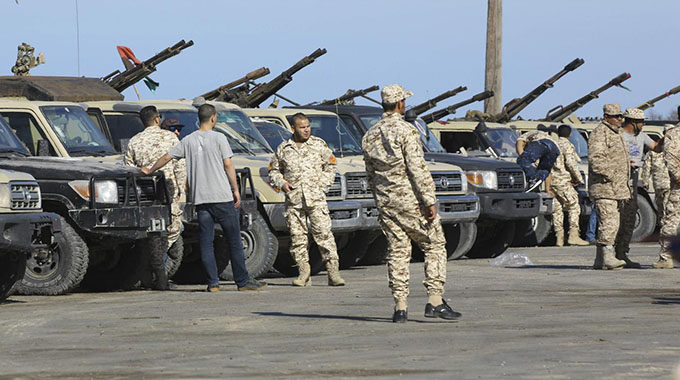Libya clashes death toll rises to 32: UN-backed government

TRIPOLI. – Libya is back in the headlines after one of its two competing governments sent troops towards Tripoli. At least 32 people have been killed and around 50 wounded in fighting with strongman Khalifa Haftar’s troops near Tripoli, the UN-backed government said.
Health minister A’hmid Omar gave the updated death toll in an interview with Libya’s Al-Ahrar television station late Sunday. Haftar’s forces have so far said 14 of their fighters have died.
Fierce clashes raged on Sunday near Tripoli between pro-Haftar fighters and troops loyal to the internationally recognised Government of National Accord (GNA).
The two sides also exchanged air strikes days after Haftar — who backs an administration in eastern Libya opposed to the GNA — launched an offensive Thursday to seize the capital.
The clashes came despite calls by the United Nations and the United States for an urgent ceasefire. Pro-GNA forces on Sunday announced a counteroffensive named “Volcano of Anger”.
Spokesman Colonel Mohamed Gnounou said the operation was aimed at “purging all Libyan cities of aggressor and illegitimate forces”, in reference to Haftar’s fighters.
Libya has been riven by divisions since the NATO-backed uprising in 2011 that killed long-time strongman leader Muammar Gaddafi with rival administrations and armed groups vying for power and control of the country’s oil.
Haftar’s offensive has threatened to plunge the country into a full-blown civil war and once again thwart diplomatic efforts to find a solution to Libya’s woes.
Meanwhile, an expert told RT that if another bloodbath happens in Libya, it will be the inevitable result of the 2011 NATO bombing campaign.
The Northern African country was once stable and quite prosperous thanks to large revenues from oil trade. But since 2011, when NATO supported a militant uprising and helped topple Gaddafi, it remains a fractured failed state. Last week, the unending feuds between rival factions escalated, with Haftar, a powerful military commander, launching an offensive against his rivals from the UN-recognised government in Tripoli.
The general is unlikely to immediately heed calls for a political settlement, believes US political commentator and historian Gerald Horne. This may escalate into a major battle in the capital.
“You may well expect a bloodbath to unfold in Tripoli. Which is quite tragic and unfortunate, but I’d say it’s the inevitable outcome of the ill-advised attack by NATO, led by the US, that resulted in the 2011 overthrow of Gaddafi,” he told RT.
The blowback from Gaddafi’s ouster is undeniable and has had a profound effect on other nations, not only in Africa but also in Europe. The 2015 migration crisis in Europe was facilitated by lawlessness in Libya, which served as a launching pad for human traffickers sending asylum-seekers across the Mediterranean to Italy and Greece, for example, Horne pointed out. – AFP/RT
Health minister A’hmid Omar gave the updated death toll in an interview with Libya’s Al-Ahrar television station late Sunday. Haftar’s forces have so far said 14 of their fighters have died.
Fierce clashes raged on Sunday near Tripoli between pro-Haftar fighters and troops loyal to the internationally recognised Government of National Accord (GNA).
The two sides also exchanged air strikes days after Haftar — who backs an administration in eastern Libya opposed to the GNA — launched an offensive Thursday to seize the capital.
The clashes came despite calls by the United Nations and the United States for an urgent ceasefire. Pro-GNA forces on Sunday announced a counteroffensive named “Volcano of Anger”.
Spokesman Colonel Mohamed Gnounou said the operation was aimed at “purging all Libyan cities of aggressor and illegitimate forces”, in reference to Haftar’s fighters.
Libya has been riven by divisions since the NATO-backed uprising in 2011 that killed long-time strongman leader Muammar Gaddafi with rival administrations and armed groups vying for power and control of the country’s oil.
Haftar’s offensive has threatened to plunge the country into a full-blown civil war and once again thwart diplomatic efforts to find a solution to Libya’s woes.
Meanwhile, an expert told RT that if another bloodbath happens in Libya, it will be the inevitable result of the 2011 NATO bombing campaign.
The Northern African country was once stable and quite prosperous thanks to large revenues from oil trade. But since 2011, when NATO supported a militant uprising and helped topple Gaddafi, it remains a fractured failed state. Last week, the unending feuds between rival factions escalated, with Haftar, a powerful military commander, launching an offensive against his rivals from the UN-recognised government in Tripoli.
The general is unlikely to immediately heed calls for a political settlement, believes US political commentator and historian Gerald Horne. This may escalate into a major battle in the capital.
“You may well expect a bloodbath to unfold in Tripoli. Which is quite tragic and unfortunate, but I’d say it’s the inevitable outcome of the ill-advised attack by NATO, led by the US, that resulted in the 2011 overthrow of Gaddafi,” he told RT.
The blowback from Gaddafi’s ouster is undeniable and has had a profound effect on other nations, not only in Africa but also in Europe. The 2015 migration crisis in Europe was facilitated by lawlessness in Libya, which served as a launching pad for human traffickers sending asylum-seekers across the Mediterranean to Italy and Greece, for example, Horne pointed out. – AFP/RT








Comments